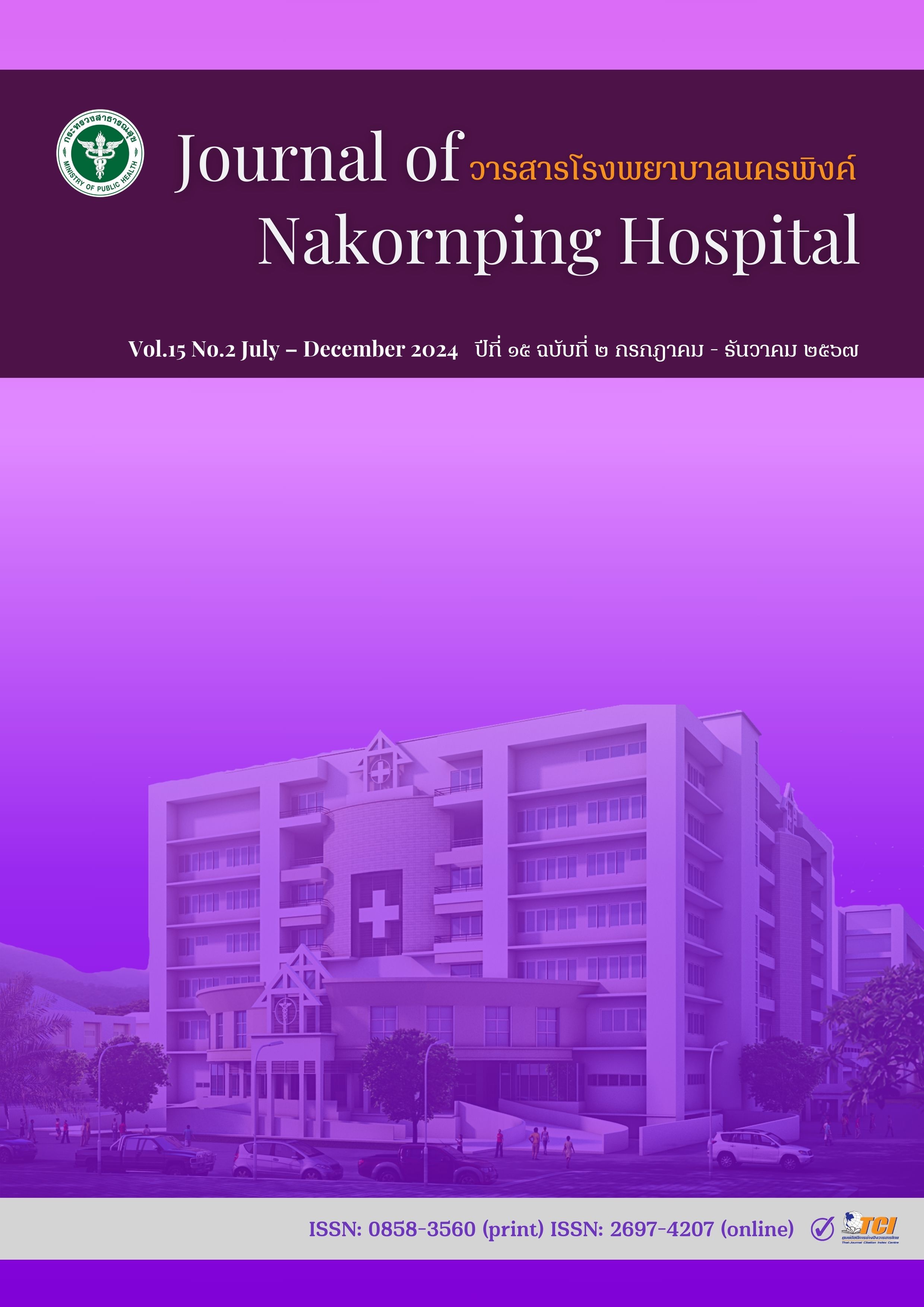Exploring the correlation between body mass index and severity of COVID-19 in adult patients at Nakornping Hospital, Chiang Mai Province
Keywords:
BMI, COVID-19, age, severityAbstract
Background: Body mass index (BMI) has been identified as a significant risk factor associated with the severity of coronavirus disease 2019 (COVID-19).
Objectives: This study aims to determine the BMI threshold that accurately predicts the severity of COVID-19 infection. Additionally, it explores the relationship between BMI, age, comorbidities, and disease severity at Nakornping Hospital, Chiang Mai.
Methods: A retrospective cohort study was conducted, including all COVID-19 patients aged 15 years or more, diagnosed with real-time PCR, and hospitalized between January 1, 2020, and May 25, 2021.
Results: The study comprised 195 patients, revealing that individuals with a BMI ranging from 26 to 29.99 and those with a BMI over 30 kg/m² had a higher likelihood of experiencing severe COVID-19 infection in 2019. The adjusted risk ratios for these BMI categories were 1.35 (95% CI 1.351-1.352) and 3.03 (95% CI 2.101-4.373), respectively, with a p-value of less than 0.001. Additionally, individuals with a BMI of 30 or above, along with age and chronic kidney disease, were identified as contributors to the increased severity of COVID-19.
Conclusion: Patients with a BMI of 30 kg/m² or above, advanced age, and chronic kidney disease are factors contributing to the severity of coronavirus infection. Notably, individuals with a BMI above 26 and age over 40 were found to be better predictors of severity compared to those with a BMI over 30 and age over 60.
References
World Health Organization. WHO COVID-19 dashboard: COVID-19 cases (datadot) [Internet].Switzerland: World Health Organization; c2024. Available from: https://data.who.int/dashboards/covid19/cases?n=c
Peckham H, de Gruijter NM, Raine C, Radziszewska A, Ciurtin C, Wedderburn LR, et al. Male sex identified by global COVID-19 meta-analysis as a risk factor for death and ITU admission. Nat Commun. 2020;11(1):6317. doi: 10.1038/s41467-020-19741-6.
Suleyman G, Fadel RA, Malette KM, Hammond C, Abdulla H, Entz A, et al. Clinical Characteristics and Morbidity Associated With Coronavirus Disease 2019 in a Series of Patients in Metropolitan Detroit. JAMA Netw Open. 2020;3(6):e2012270. doi: 10.1001/jamanetworkopen.2020.12270.
Biswas M, Rahaman S, Biswas TK, Haque Z, Ibrahim B. Association of Sex, Age, and Comorbidities with Mortality in COVID-19 Patients: A Systematic Review and Meta-Analysis. Intervirology. 2021;64(1):36-47. doi:10.1159/000512592
Froldi G, Dorigo P. Endothelial dysfunction in Coronavirus disease 2019 (COVID-19): Gender and age influences. Medical Hypotheses. 2020;144:110015. doi:10.1016/j.mehy.2020.110015
Gallo Marin B, Aghagoli G, Lavine K, Yang L, Siff EJ, Chiang SS, et al. Predictors of COVID‐19 severity: A literature review. Rev Med Virol. 2021;31(1):1-10. doi: 10.1002/rmv.2146.
Grasselli G, Zangrillo A, Zanella A, Antonelli M, Cabrini L, Castelli A, et al. Baseline Characteristics and Outcomes of 1591 Patients Infected With SARS-CoV-2 Admitted to ICUs of the Lombardy Region, Italy. JAMA. 2020;323(16):1574-81. doi:10.1001/jama.2020.5394
Mahase E. Covid-19: Why are age and obesity risk factors for serious disease?. BMJ. 2020;371:m4130. doi: 10.1136/bmj.m4130
Hendren NS, de Lemos JA, Ayers C, Das SR, Rao A, Carter S, et al. Association of Body Mass Index and Age With Morbidity and Mortality in Patients Hospitalized With COVID-19: Results From the American Heart Association COVID-19 Cardiovascular Disease Registry. Circulation. 2021;143(2):135-44. doi: 10.1161/CIRCULATIONAHA.120.051936.
Sattar N, Ho FK, Gill JM, Ghouri N, Gray SR, Celis-Morales CA, et al. BMI and future risk for COVID-19 infection and death across sex, age and ethnicity: Preliminary findings from UK biobank. Diabetes Metab Syndr. 2020;14(5):1149-51. doi: 10.1016/j.dsx.2020.06.060.
Williamson EJ, Walker AJ, Bhaskaran K, Bacon S, Bates C, Morton CE, et al. Factors associated with COVID-19-related death using OpenSAFELY. Nature. 2020;584(7821):430-6. doi: 10.1038/s41586-020-2521-4.
Gao M, Piernas C, Astbury NM, Hippisley-Cox J, O'Rahilly S, Aveyard P, et al. Associations between body-mass index and COVID-19 severity in 6·9 million people in England: a prospective, community-based, cohort study. Lancet Diabetes Endocrinol. 2021;9(6):350-9. doi: 10.1016/S2213-8587(21)00089-9.
Jayanama K, Srichatrapimuk S, Thammavaranucupt K, Kirdlarp S, Suppadungsuk S, Wongsinin T, et al. The association between body mass index and severity of Coronavirus Disease 2019 (COVID-19): A cohort study. PLoS One. 2021;16(2):e0247023. doi: 10.1371/journal.pone.0247023.
Simonnet A, Chetboun M, Poissy J, Raverdy V, Noulette J, Duhamel A, et al. High Prevalence of Obesity in Severe Acute Respiratory Syndrome Coronavirus-2 (SARS-CoV-2) Requiring Invasive Mechanical Ventilation. Obesity (Silver Spring). 2020;28(7):1195-9. doi: 10.1002/oby.22831.
Aghili SMM, Ebrahimpur M, Arjmand B, Shadman Z, Pejman Sani M, Qorbani M, et al. Obesity in COVID-19 era, implications for mechanisms, comorbidities, and prognosis: a review and meta-analysis. Int J Obes (Lond). 2021;45(5):998-1016. doi: 10.1038/s41366-021-00776-8.
Patanavanich R, Glantz SA. Smoking Is Associated With COVID-19 Progression: A Meta-analysis. Nicotine Tob Res. 2020;22(9):1653-6. doi: 10.1093/ntr/ntaa082.
Mantovani A, Byrne CD, Zheng MH, Targher G. Diabetes as a risk factor for greater COVID-19 severity and in-hospital death: A meta-analysis of observational studies. Nutr Metab Cardiovasc Dis. 2020;30(8):1236-48. doi: 10.1016/j.numecd.2020.05.014.
Huang Y, Lyu X, Li D, Wang L, Wang Y, Zou W, et al. A cohort study of 676 patients indicates D-dimer is a critical risk factor for the mortality of COVID-19. PLoS One. 2020;15(11):e0242045. doi: 10.1371/journal.pone.0242045.
Atmosudigdo IS, Lim MA, Radi B, Henrina J, Yonas E, Vania R, et al. Dyslipidemia Increases the Risk of Severe COVID-19: A Systematic Review, Meta-analysis, and Meta-regression. Clin Med Insights Endocrinol Diabetes. 2021;14:1179551421990675. doi: 10.1177/1179551421990675.
Ofori-Asenso R, Ogundipe O, Agyeman AA, Chin KL, Mazidi M, Ademi Z, et al. Cancer is associated with severe disease in COVID-19 patients: a systematic review and meta-analysis. Ecancermedicalscience. 2020;14:1047. doi: 10.3332/ecancer.2020.1047.
Kim JA, Montagnani M, Chandrasekran S, Quon MJ. Role of lipotoxicity in endothelial dysfunction. Heart Fail Clin. 2012;8(4):589-607. doi: 10.1016/j.hfc.2012.06.012.
Downloads
Published
How to Cite
Issue
Section
License
Copyright (c) 2024 Nakornping Hospital

This work is licensed under a Creative Commons Attribution-NonCommercial-NoDerivatives 4.0 International License.
The articles that had been published in the journal is copyright of Journal of Nakornping hospital, Chiang Mai.
Contents and comments in the articles in Journal of Nakornping hospital are at owner’s responsibilities that editor team may not totally agree with.



